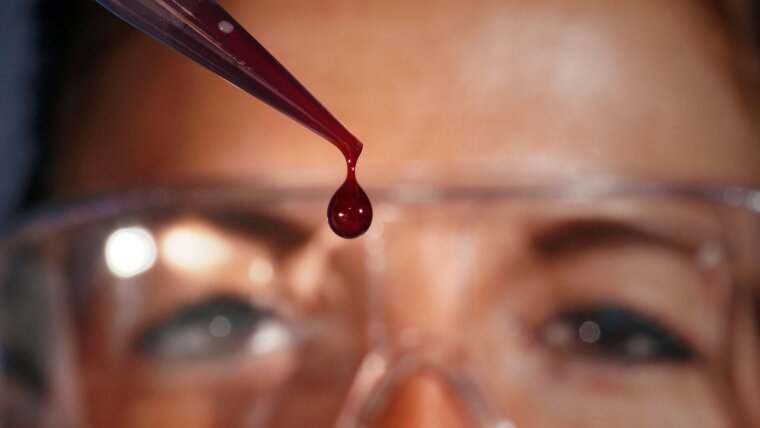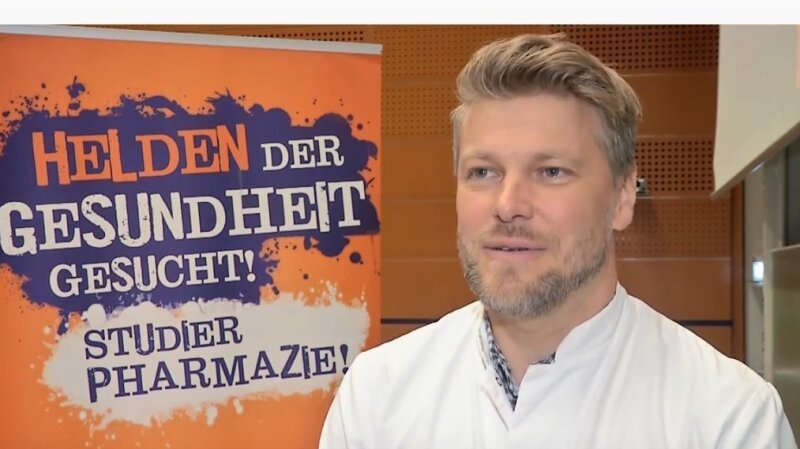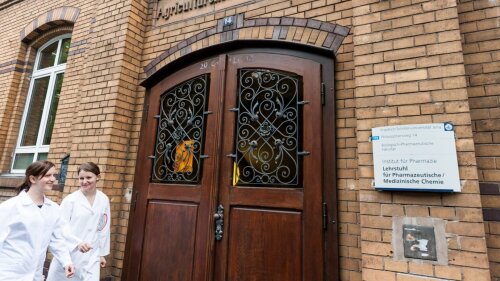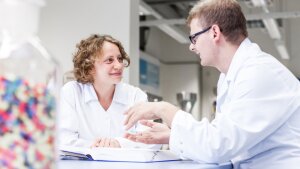
- Degree
- state examination
- Admission restriction
- with Numerus Clausus (NC)
- Duration
- 8 Semesters
- Credits/ECTS
- None
- Teaching language
- German
- Tuition fee
- None
- Semester contribution
- € 272,65
- Start of studies
- Winter semester
- Part-time possible
- No
- Institutions
- Faculty of Biological Sciences
- Institute of Pharmacy
-
Foundation studies
1st semester
- General and Analytical Chemistry of Inorganic Medicinal Substances, Excipients and Harmful Substances
- Mathematical and Statistical Methods for Pharmacists
- Pharmaceutical and Medicinal Terminology
2nd semester
- Quantitative Determination of Medicinal Substances, Excipients and Harmful Substances
- Physics Exercises for Pharmacists
- Medicinal Plant Excursions and Identification Exercises
- Chemical Nomenclature
3rd semester
- Physics and Chemistry Exercises for Pharmacists
- Chemistry of Inorganic Medicinal Substances, Excipients and Harmful Substances
- Cytological and Histological Fundamentals of Biology
- Physiology Course
- Stereochemistry
4th semester
- Drug Development
- Instrumental Chemistry
- Microbiology
- Pharmaceutical Biology I
- Pharmaceutical Biology II
You will complete your foundation studies (Grundstudium) by taking a pharmaceutical examination (1st state examination). An 8-week clinical internship (Famulatur) must be completed by the end of the first part of the degree programme. This is done during non-teaching periods.
You can find more detailed information in the syllabus External link.
-
Advanced studies
5th semester
- Drug Analysis with Special Consideration of Pharmacopoeias
- Biochemical Testing Methods (incl. Clinical Chemistry)
- Quality Assurance in Pharmaceutical Production and Testing
6th semester
- Drug Analysis and Monitoring, Toxicological and Environmental Studies
7th semester
- Pharmaceutical Biology III
- Pharmaceutical Technology
- Pharmacotherapy
8th semester
- Pharmaceutical and Toxicological Demonstration
- Clinical Pharmacy (incl. Pharmaceutical Epidemiology and Pharmaceutical Economics)
- Biogenic Substances in Medicine
- Biopharmaceuticals (incl. Pharmacokinetics in Drug Development)
- Required elective module: research project at an institute of the University of Jena or a non-university institution
You will complete your advanced studies by taking a pharmaceutical examination (2nd state examination).
You can find more detailed information in the syllabusExternal link.
-
Practical year
Your degree programme will be followed by a twelve-month internship, at least half of which will have to be done in a public pharmacy. You will be able to do the other half in a hospital pharmacy or military pharmacy, in the pharmaceutical industry or at university institutes.
You will finish your practical training (and become a fully qualified pharmacist) by taking a pharmaceutical examination (3rd state examination).
After graduating from the degree programme, you will be able to apply for an official licence to practice pharmacy. This licence is valid throughout Germany and in all other EU countries.
You can find more detailed information in the Licensing Regulations for PharmacistsExternal link.
in conversation
Image: Sebastian ReuterPharmacists work in public pharmacies, hospital pharmacies, the pharmaceutical industry, chemical and drug testing agencies, administration, specialist publishing houses, and environmental health and environmental protection. They can also go into teaching at universities and technical colleges.
-
University entrance qualification
A university entrance qualification, such as a general secondary school leaving certificate, is required for admission onto the study programme.
More information on university entrance qualifications can be found here.
-
language requirements
At the moment of application, you have to prove your knowledge of the German language at level DSH-2 (German Language Test for Admission to Higher Educationpdf, 61 kb · de). You cannot start your studies at the Friedrich Schiller University Jena if you have only passed the DSH-1 exam! The following certificates accredited by the German Rectors Conference will be recognized as equivalents:
- Goethe Certificate C2 (GDS)
- German Language Diploma Level II of the KMK (DSD II)
- TestDaF, at least TDN 4 in all four parts of the examination
- telc Certificate C1 German for Higher Education
- German exam as part of the assessment test at a Studienkolleg
If you do not have sufficient knowledge of German yet, the Friedrich Schiller University Jena offers you a preparatory language course for the DSH exam. To attend the course, your German knowledge must be at least on level B1.
Room 403
Philosophenweg 12
07743 Jena
Google Maps site planExternal link
Weimarplatz 4
99423 Weimar
Google Maps site planExternal link
Fürstengraben 26
07743 Jena
Google Maps site planExternal link
University Main Building / SSZ
Fürstengraben 1
07743 Jena
Google Maps site planExternal link
Office hours:
Please note: The Central Student Advisory Service will not be available from 21.12.2024. We will be back for you on Monday, 06.01.2025.
We offer consultations in person, by telephone, and via Zoom. You can make an appointment by calling us on +49 3641 9-411111 (Mondays to Fridays from 9:00 to 11:00) or outside these office hours on +49 3641 9-411200. You can also use our remote help desk.
Consultation hours:
Mondays, Tuesdays, Thursdays and Fridays (9:00 to 12:20), Tuesdays (14:00 to 18:00), and Wednesdays and Thursdays (14:00 to 16:00).
Video chat: To the video chat – Zoom Videochat ZeitenMondays to Fridays (12:30 to 13:00) Password ZSB2020 Data protection informationpdf, 101 kb
University Main Building, Room E065
Fürstengraben 1
07743 Jena
Google Maps site planExternal link
Opening hours:
Mondays (10:00 – 12:00)
Tuesdays (13:00 – 15:00)
Wednesdays (10:00 – 12:00)
Thursdays (13:00 – 15:00)
Fridays (10:00 – 12:00)
You can also use our remote help desk at
www.uni-jena.de/service-ssz
or send us your enquiries by post.
Telephone hours:
Mondays to Fridays
(9:00 – 11:00)
Postal address:
Friedrich-Schiller-Universität Jena
Studierenden-Service-Zentrum
07737 Jena
University Main Building
Fürstengraben 1
07743 Jena
Google Maps site planExternal link


